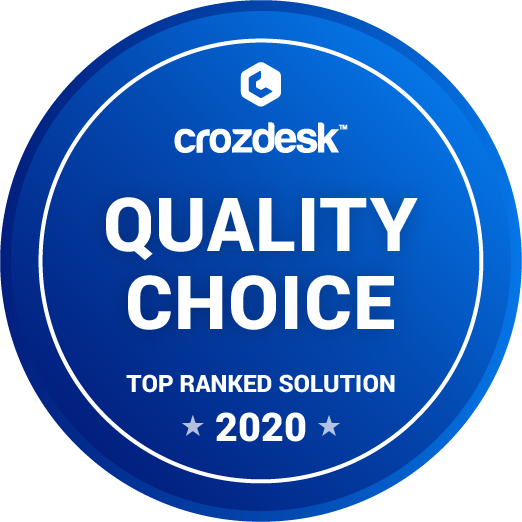
The US Business Formation Statistics received 451,752 new business applications in March 2023 alone. Though startup culture is still strong in the US, entrepreneurs don’t just have to ensure their business survives. It must also thrive.
Yet due to limited resources, they cannot hire experts to scale their business. Instead, they don several hats—business owner, product manager, accountant, marketing manager, HR, and technician—to get their business off the ground.
But juggling too many roles and putting out fires all day makes it difficult for them to achieve their business goals. However, they can lean on business management software for startups, equipped with advanced data acquisition capabilities, to turn their dreams into reality.
6 Business Management Software Every Startup Should Use in 2023
Willing your business dreams into existence is an exhilarating and fulfilling experience. Nevertheless, things can go sideways in a heartbeat if you don’t have enough team members or resources to depend on.
For instance, if your business is in its nascent stage and is strapped for cash, it’d be difficult for you to hire team members beyond those absolutely necessary.
So how about you look at the bright side and capitalize on resources you can afford?
Enter business management software for startups.
But which software should you invest in? Well, it depends on your business needs. However, understanding the types of management software and how they can help your business—individually and collectively—will help you make your choice.
Types of business management software startups can capitalize on
Business management software can automate all repetitive manual tasks and unify diversified business applications.
This helps entrepreneurs manage their operations, keep an eye on projects, and handle security risks, without getting personally involved so that they can focus on scaling and growing their businesses.
Business management software improves team collaboration, does away with data inefficiencies and inaccuracies, and saves business owners from burnout. But what are the key types of business management software?
The key types of business management software available for startups include:
- Project management software: can be used to plan projects, schedule resource allocation, and track their progress and execution.
- Risk management software: can be used to detect, monitor, and safeguard your website against fraudsters.
- Workflow management software: can be used to streamline repetitive and routine business activities.
- Accounting software: can be used to connect individual financial data and modules. It can also help glean essential insights from financial reports.
- Customer relationship management software: can enhance customer experience by providing extra customer support to make your business stand out.
- Sales, marketing, and PR software: can be used to collect and sort sales and marketing data to create value and optimize the marketing budget allocation. By integrating trackable digital sales rooms, businesses can further enhance their ability to monitor customer interactions and tailor their strategies effectively.
- Reporting and analytics software: can be used to analyze business data, gather valuable insights, and identify potential problems.
Though each of these seven management systems is vital for a business, we’ll focus on the best project, risk, and workflow management software, as these are the most important for a startup in 2023. Let’s get started!
2 Best risk management software
A dependable risk management software will protect your business from bad actors. But while selecting one, ensure that they meet the criteria listed below:
- Compliance with risk rules: filter user action based on your risk rules and take necessary measures.
- Managing risk scores: to help you decide how risky a user’s actions are.
- Offering real-time monitoring: fraudsters must be stopped in real-time.
- Use of machine learning: machine learning algorithms will aid you in discovering pain points based on your business’s data.
So without further ado, here’s two main types of the best risk management software.
1. Cost-effective and suitable for all businesses
The best fraud detection software can help you address the most common risks first. Such software provides accurate data and breaks it down into segments that are easy to grasp.
Additionally, such solutions:
- are fully customizable,
- are equipped with device fingerprinting to create consumer profiles,
- usually employ ML algorithms to take a deep dive into your customer data, provide fraud insights, and uncover your consumer’s patterns, anomalies, and trends, and
- combine first-party data with email and IP addresses, phone numbers, and social media accounts to give you a comprehensive view of your consumers and their intentions.
Wondering whether this sophisticated technology will be difficult to integrate with your existing APIs? Not quite. Some risk management software hire fraud experts to handle software integration and allow you to set the risk rules based on your pain points and risk appetite.
This solution can also help you comply with the Countering of the Financing of Terrorism (CFT) and Anti-Money Laundering (AML) regulations using the AML toolkit for risk and compliance screening.
The cherry on top? Small and medium-sized businesses can use this solution for free without worrying about an upper limit for users or risk rules.
2. Software tailored for ecommerce merchants
If you’re in the ecommerce space, look for an established risk management software with a focus on securing online stores globally.
Such solutions will allow you to secure your business if you:
- deal with a large volume of transactions,
- need chargeback and abuse protection, and
- want to optimize your payments.
Most solutions tailored for ecommerce businesses offer automated chargeback protection that can be set up with minimal inputs and are PSD2-compliant. This way you don’t have to worry about compliance for EU-based payments and can focus on ways to grow your online business.
2 Best project management software
Startups need dynamic strategies for effective project management. They also need efficient project management software to map out a project, organize and allocate related tasks, and ensure that the project is on track to meet business goals and deadlines.
Listed below are the two best project management software.<
1. monday.com: suitable for planning and monitoring projects across teams
As a project management software, monday.com is useful for multiple tasks, since looking for automation and integration to power your projects. It’s also perfect for startups with zero capital to spend or businesses that need to stretch their budget thin.
This tool allows startups to create custom boards for each project using over 200 templates. This will enable teams to easily:
- communicate with each other,
- optimally utilize available resources,
- stay within budget,
- track progress using Gantt charts, and
- account for iterations to wrap up the project within the projected deadline.
Additionally, monday.com offers integrations with tools like Slack, Salesforce, Google Suite, Zoom, and more so that you find all you’re looking for in one place. It also has iOS and Android apps to empower scattered teams.
You can use monday.com for free and even try out free trials of various apps before you invest in their paid version as your business and budget grow.
2. Asana: a good fit for cross-collaboration
Trusted by almost 80% of Fortune 100 companies and recognized as the best project management tool, Asana is a powerhouse.
Startups and enterprises trust Asana because they can:
- plan projects using Timeline to discover all the dependencies so that the project gets completed on time, even if some work changes along the way,
- undertake projects faster with Forms to share all relevant details and manage all work requests,
- automate regular tasks and minimize errors,
- view project dashboards and updates in real-time, and
- manage access controls.
You can try out Asana for free before upgrading to its premium plan. It’s also equipped with over 100 integrations, such as Dropbox, Slack, Microsoft Teams, Google Drive, Canva, and more.
2 Best workflow management software
Workflow management software allows you to formulate, chalk out, and undertake the steps needed to achieve your long-term business goals.
1. Wrike: useful for versatile startups
If your team consists of five members or more and you’re scaling rapidly, Wrike is an amazing tool that can simplify your workflows.
Wrike is an interactive and easy-to-use software that lets you personalize your dashboards, request forms, and reports. Additionally, you can:
- switch between Kanban boards,
- use Gantt charts like a pro with its drag-and-drop feature,
- communicate in real-time with comments and mentions,
- easily share files,
- create tasks, subtasks, and lists, and
- take advantage of in-built project templates, performance reporting, and resource management tools.
Wrike also includes over 400 integrations with Microsoft, Zoom, Tableau, Google, Dropbox, Salesforce, and Marketo.
2. Nintex: comprehensive workflow automation tool
Nintex is user-friendly and automates all your business processes at a low cost to support your operations and enhance customer satisfaction. Moreover, you can create automated workflows in minutes without writing a single line of code.
It’s popular among startups because they can:
- formulate, execute, and refine their workflows in minutes,
- collaborate across channels without glitches,
- integrate this solution with their existing on-premises, cloud, or hybrid systems, and
- optimize and automate tasks and processes with process mapping and robotic process automation (RPA).
Leverage business management software for your startup
Whatever your needs, business management software can help you automate your workflows, track your project’s progress, and protect your business from fraudsters. Embrace the software that works best for you and your team to witness your business reach new heights.
Raghav is a talented content writer with a passion to create informative and interesting articles. With a degree in English Literature, Raghav possesses an inquisitive mind and a thirst for learning. Raghav is a fact enthusiast who loves to unearth fascinating facts from a wide range of subjects. He firmly believes that learning is a lifelong journey and he is constantly seeking opportunities to increase his knowledge and discover new facts. So make sure to check out Raghav’s work for a wonderful reading.




